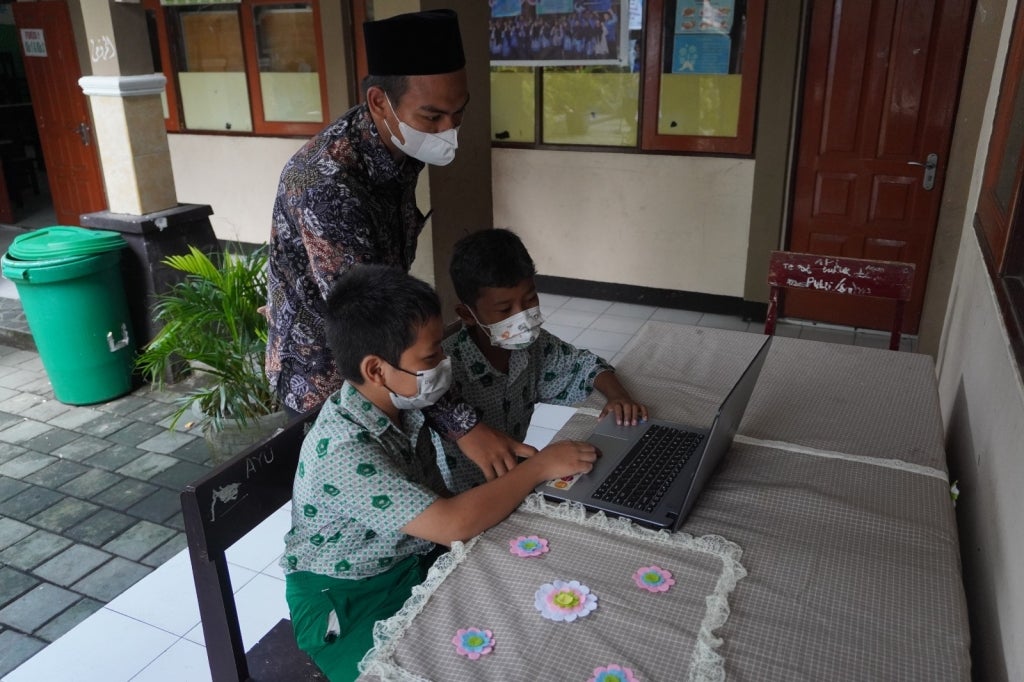 Indonesian teacher when working online from home
Indonesian teacher when working online from home
The COVID-19 pandemic has forced teachers around the world, including in Indonesia, to quickly adapt and develop new skills to deliver classes online, while the professional development support they receive has also shifted to the virtual format. As such, online training for teachers surged during the pandemic.
A World Bank report, The Digital Future of Teacher Training in Indonesia: What’s Next? funded by the Australian government, sought to understand the reach of online training for Indonesian teachers, including how the training was perceived by teachers, and whether it was effective. The study’s findings suggest that while many teachers are eager to get online training, access and impacts were uneven, and a number of improvements might enable Indonesia to take more effective advantage of this form of professional development.
The report, which analyzed a phone-based survey that was conducted in February-March 2021 involving 435 primary and junior secondary teachers across 30 different provinces across Indonesia, found that:
There is a great demand for online training for teachers. Around 1.15 million teachers or 44 percent of all primary and junior secondary teachers in Indonesia participated in online learning during the pandemic. Although 75 percent of those teachers said they had never had this sort of training before, 89 percent said they would like to continue receiving it. School closures pushed many teachers to overcome psychological and technical hurdles to participation and forced them to innovate and adapt (Bhardwaj, Yarrow and Cali, 2020). Mobility restrictions increased both the supply of and the demand for online learning opportunities for teachers, which are expected to persist.
Participation and completion of online training for teachers were uneven. Of teachers who did not participate in online training, one-third indicated the reason was their lack of internet access, while another 30 percent did not know about the programs . Completion rates of online learning courses were higher for teachers who live in urban areas (92 percent), who had better internet connections compared to their rural peers (74 percent).
Completion rates were higher when tied to a promotion. Training completion rates were 97.9 percent when tied to career promotion (97.9 percent) compared to 79.6 percent when the courses were requested by their school’s principal.
However, overall, the survey indicated that more can be done to design programs that can support and motivate teachers to complete the training and apply what they learned. More than half of the responding teachers needed more support to apply what they learned in their classrooms. Evidence from the report showed that only a few online training programs included elements necessary to enable teachers to improve their teaching skills or encourage them to practice their newly acquired teaching techniques or skills in coaching students and providing feedback to them.

To make online training more effective:
At the program level
- Integrate teaching practice into the program and provide follow-up support for teachers. For example, a program that can include regular virtual follow-up meetings and require teachers to record their teaching and share this with their trainers or mentors for direct and detailed feedback is likely to be more effective. Successful online Teacher Professional Development (TPD) in other countries showed that targeted feedback to teachers during online training programs resulted in improvements in learning (Allen et al., 2011; Powel et al, 2010; Cilliers et al, 2021).
- Provide a greater variety of training topics, especially in subject-specific areas. While teachers with low technical skills need to learn how to deliver online teaching using the current technology, they also need to learn how to improve their skills and knowledge to help students recover from learning loss during the pandemic.
- When schools reopen and social restrictions are lifted, adopt blended models for an impactful and scalable teacher training program. This model could use face-to-face contact, which is helpful at the start of the training program for in-person observation, followed by online support and coaching.
At the system level
- Collect and distribute information about online programs. This includes information about the training programs’ content, length, modalities, and cost. Such information will help all government levels and the private sector to identify gaps and help teachers to access and select the most appropriate training for their needs.
- Set standards and regulate for quality. This can be done by providing more information about different training modalities and their effectiveness, ensuring data protection and security, and encouraging customized learning, which is necessary for addressing different levels of teacher skills and challenges.
- Measure the impact and cost-effectiveness of online training programs. Though challenging, it is essential to measure the training’s impact on teacher practices and student learning outcomes to justify the expense of these programs and guide teachers and providers to the most effective approaches.
- Enhance Indonesia’s digital infrastructure and connectivity for schools, teachers and students. Teachers in rural areas face more difficulties accessing online training programs due to weak internet connectivity. Ensuring equitable teacher access to high internet bandwidth and sufficient hardware to participate in online training is crucial.
- Ensure data security and make sure that teachers understand it. Teachers need to be aware of data privacy and protection and grasp the new challenges of working in a digital environment. This will help prevent data misuse.
While there is great demand for online teacher training, for it to be fully effective, it must be balanced with improved digital infrastructure and rigorous training programs that will support teachers as they put what they have learned into practice. Teachers are key actors in quality education. Improving the quality of online teacher training program has the potential to make a substantial contribution to raising Indonesia’s human capital.



Join the Conversation